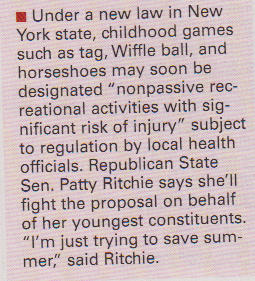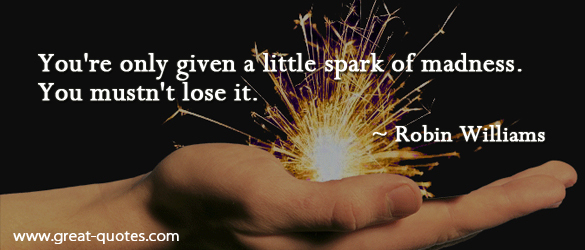Articles and information about why play is crucial to children’s development, and the state of play in childhood now. Also, beyond the obvious joy of play, what are a few of the mental advantages of more specific kinds of play?
Below are links to various newspaper, journal, and organization articles. After that table, there are a series of images that speak to some element of play, even lightheartedly. 🙂
|
“10 Reasons Play Makes Babies Smarter” From social development to impulse control to concentration to physical development, this article very briefly touches these and other bases. |
|
|
Newsweek reports on a decrease in creativity over generations, measured by the Torrance’s test. Pull quote, “A recent IBM poll of 1,500 CEOs identified creativity as the No. 1 “leadership competency” of the future.” |
|
|
NYT article on the effort to restore children’s play, in particular unstructured play. |
|
|
The mediation of conflict and learning of self-control are highlighted in this article. |
|
|
Play spawns creativity and exploration. Curiosity . . . remaining open to new information and possibilities is key, and play fosters that. |
|
|
A balanced article that discusses the social and cognitive benefits of play, as well as offering useful references and sources to dive deeper. Discusses dissenting ideas around the importance of play as well. |
|
|
Their summary files are free, and include topics such as play in kindergarten, children in nature, value of play, and technology and children. |
|
|
Playworks is a nonprofit organization that takes play into schools |
From this link, you can access “Studies on play,” “Play in the press,” “Stories of play,” and more. |
|
University of California at Berkeley operates the “Greater Good Center,” offering numerous resources, including this podcast. |
|
|
Childhood Revisited: the changing nature of childhood play. Child-created and centered play was common, and now is uncommon. Structured play and lessons are the norm. |
|
|
CNN article that speaks to social skills built in play, learning enhancement via play, self-regulation, and problem solving. Play enhances emotional intelligence. |
|
|
A brief history of play, commercialization of play, and the thing-centered play movement, now very alive today. Also speaks to self-regulation and imaginative play. |
|
|
Relearning how to play. For toddlers to tween, there should be more roughhousing and fantasy feeding development than screen time and hovering parents |
|
|
YouTube video on the importance of play within families. |
|
|
A website that collects information on both |
|
|
Guess who reads TONS of teen and childrens’ books? Adults!! 🙂 |
|
|
TED talk by Gever Tulley, who runs the tinkering school. He has also authored a book and a summer program and a school called Brightworks. |
|
|
British organization, “Play England,” that offers resources and activism around children’s play. Check out their literature review. And, their blog. |
|
|
Useful feed with articles and links about play in all forms and places. |
|
|
Einstein May Never Have Used Flashcards, but He Probably Built Forts |
|
|
Documentary film on how children’s health is impacted by suburban sprawl and congestion. |
|
|
British paper, The Telegraph, reports on the National Trust’s effort to get children out playing and taking some risks. |
|
|
Pretend play certainly has joy in its own right, yet its ability to give significant advantage has not been determined. |
|
|
101 Fun Things To Do With Kids To Enjoy Everyday Family Life |
A grab bag of ideas. Pick a few that you think might work for your family and give them a shot. Come back in a few days and pick a few more. And do it until you’re able to look at a perfectly routine, even boring or stressful situation and automatically find joy in it! |
At Camp Augusta, children have the opportunity to create their own play together in Cabin Activities and Rest Hour, and with Playstation within a presented general frame. During Evening Programs, campers decide how they want to engage in a created world, of which they are central characters to the world’s development and outcome.
The below “stickers” are from MAKE magazine, offering a tongue-in-cheek look at the state of play in America.


Professor McCracken, Harvard
Quoted in: “Build This: Your Culturematic Laboratory.”
At a time when the US unemployment rate topped 10 percent, the rate of unemployment for the Creative Class did not hit even 5 percent. By late 2011, the social media site LinkedIn reported that the word most used by its members to describe themselves was—you guessed it—“creative.” As TechCrunch put it: “In a time of high unemployment, when traditional skills can be outsourced or automated, creative skills remain highly sought after and highly valuable.
Professor Florida: Unleashing the Creative Reservoir: The Rise of the Creative Class, Revisited
“The myth of innovation is that it starts with entrepreneurs, but it really starts with people having fun. The Wright brothers weren’t trying to build an airline, they were saying, ‘Holy shit, do you think we could fly?’ The first kids who made snowboards, they just glued skis together and said, ‘Let’s try this!’ With the web, none of us thought there was money in it. People said, ‘This document came from halfway around the world. How awesome is that!'”
So what if we all stopped trying to “innovate”–and started trying to have fun and really do something new? Tim O’Reilly

